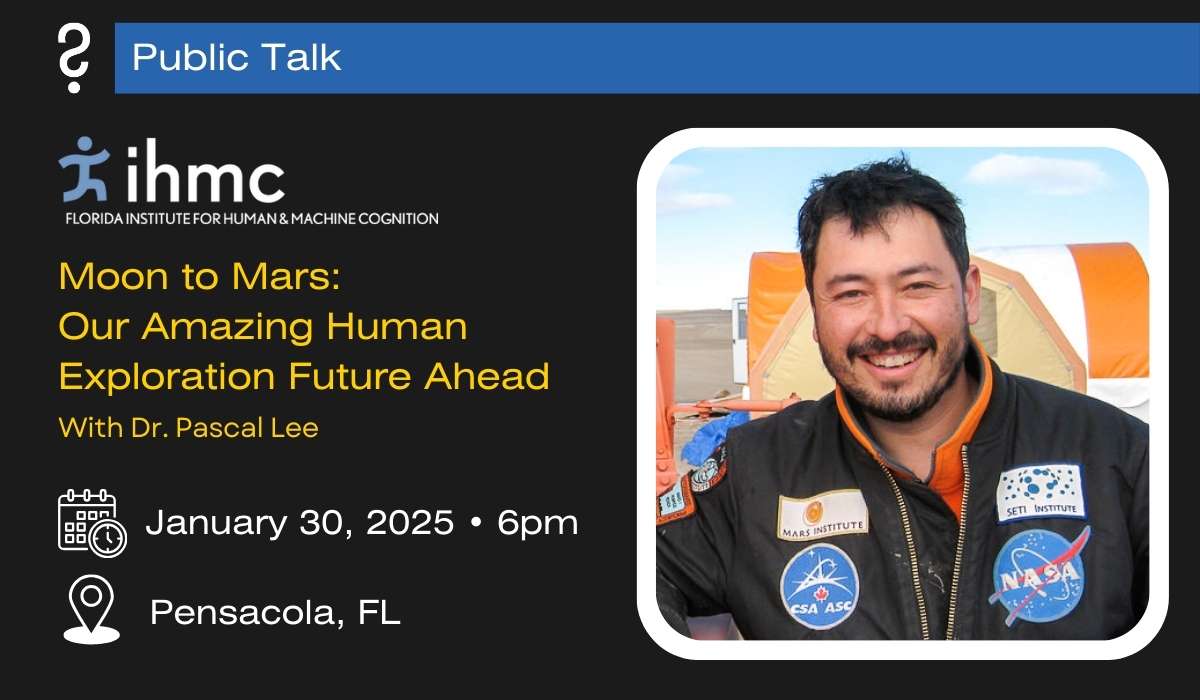Florida Institute for Human and Machine Cognition

Tags: Mars, Mars Institute
Time: Thursday, Jan 30, 2025
Location: Pensacola, FL
Dr. Pascal Lee kicks off 2025 Evening Lectures in Pensacola
Dr. Pascal Lee had led more than 30 expeditions to the Arctic and Antarctic to gain knowledge that might be helpful for a greater adventure — Mars.
Lee, a planetary scientist with the SETI Institute, the Mars Institute, and NASA Ames Research Center, brings his vision for reaching this next, lofty goal to the first Evening Lecture of 2025 hosted by the Florida Institute for Human and Machine Cognition.
His talk, “Moon to Mars: Our Amazing Human Exploration Future Ahead,” begins at 6 p.m. on Jan. 30 in the Institute’s classroom at 40 S. Alcaniz St., in downtown Pensacola.
Lee’s research focuses on the history of ice and water on the Moon and Mars and the possibilities of exploring both of these worlds. Earlier this year, he and his student, Sourabh Shubham, announced the discovery of a previously unrecognized giant volcano on Mars, the Noctis Volcano.
Returning to the Moon and venturing on to Mars will be humanity’s greatest endeavors in space this century, Lee says. Each destination offers amazing places to explore, profound science to conduct, potential resources to assess, a permanent human presence to establish, and a great future to imagine, plan and create.
His talk examines current plans to return to the Moon and journey on to Mars, the challenges this presents, the wonders that lie ahead, and the choices needed to make this possible.
He wintered-over for 402 days at the French Antarctic base, Dumont d’Urville, and also led the Northwest Passage Drive Expedition – a record-setting vehicular drive across the Arctic along the fabled Northwest Passage, which is the subject of the documentary “Passage to Mars.”
Lee is a member of the U.S. National Academies’ steering committee on “A Science Strategy for the Human Exploration of Mars.” He is a recipient of the U.S. Antarctica Service Medal, the National Space Society Space Pioneer Award for Science and Engineering, the Space Frontier Foundation’s Vision to Reality Award, and the Sagan Prize for the Popularization of Science.
The Premier Sponsor of the Lecture Series is The Bear Family Foundation. Season Sponsors are The Orth Family, Clark Partington, and Joanne Bujnoski and Martin Kandes. Lecture Sponsors are Dr. Ed and Judy Galbavy: Carousel House and Dry Farm Wines.
Registration for this and every Evening Lecture is free.
Upcoming Pensacola lectures include:
Feb 13: Dr. Tim Broderick, “Wearable Devices That Extend Human Health, Performance, and Teaming.”
March 4: Michael Larson.
April 24: Dr. Dave Rabin, “The Art and Neuroscience of Self-Healing and Learning.”
May 22: Lilianne Mujica-Parodi, Director of the Laboratory for Computational Neurodiagnostics at Stony Brook University.
Visit https://www.ihmc.us/life/evening_lectures/pensacola-lecture-series/ for the latest schedule of Evening Lectures.
